Hadley Family History & Genealogy
Hadley Last Name History & Origin
AddSummary
At least one branch of the Hadley family is English and has its roots in England. The surname Hadley refers to a location - that is "a meadow or clearing in a wood or heath." The further history of the Hadley family as well as the origin of the surname Hadley have yet to be shared on this page.
History
We don't have any information on the history of the Hadley name. Have information to share?
Name Origin
Hadley may refer to a location - a meadow or clearing in a wood or heath.
Spellings & Pronunciations
We don't have any alternate spellings or pronunciation information on the Hadley name. Have information to share?
Nationality & Ethnicity
At least one branch of the Hadley family is from England. At least one branch of the Hadley family is English.
Famous People named Hadley
Are there famous people from the Hadley family? Share their story.
Early Hadleys
These are the earliest records we have of the Hadley family.

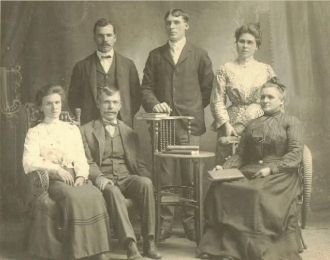

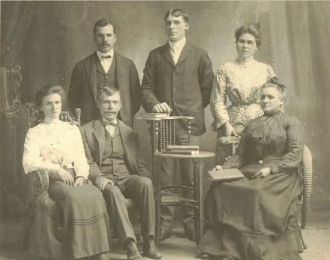
Hadley Family Members
Hadley Family Photos
Discover Hadley family photos shared by the community. These photos contain people and places related to the Hadley last name.

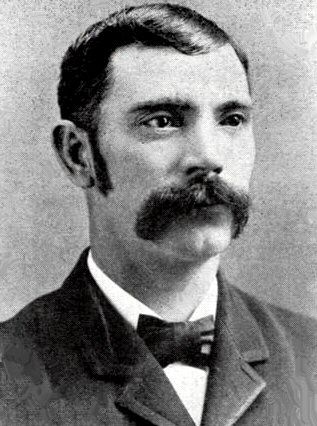
People in photo include: Levi Hadley
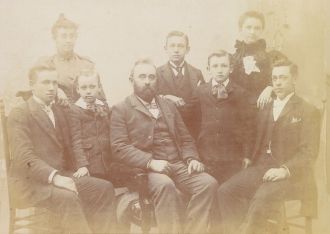
People in photo include: Samuel Hadley, Gilpin Hadley, Calvin Hadley, Albert Hadley, Elton Hadley, Etta Hadley Cliver, Harmon Hadley, and Lydia Hadley
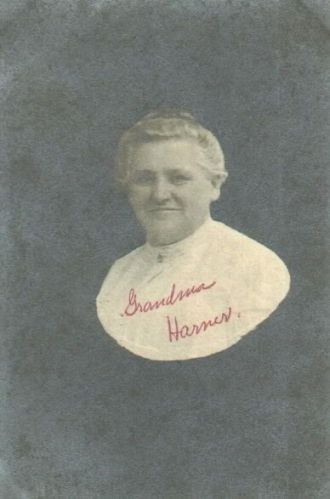

Hadley Family Tree
Discover the most common names, oldest records and life expectancy of people with the last name Hadley.
Updated Hadley Biographies
Popular Hadley Biographies




Hadley Death Records & Life Expectancy
The average age of a Hadley family member is 73.0 years old according to our database of 7,507 people with the last name Hadley that have a birth and death date listed.
Life Expectancy
Oldest Hadleys
These are the longest-lived members of the Hadley family on AncientFaces.
Other Hadley Records
Share memories about your Hadley family
Leave comments and ask questions related to the Hadley family.
Followers & Sources


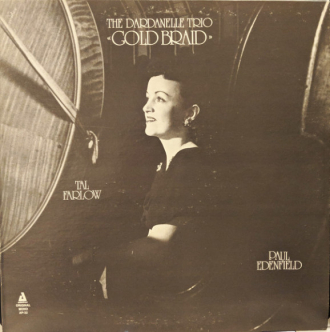

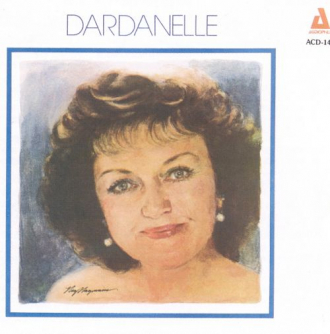

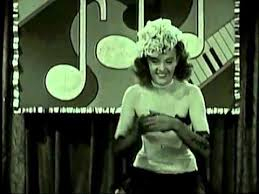
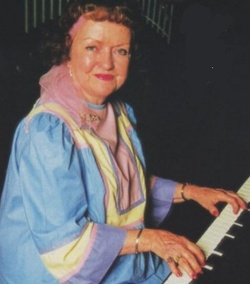
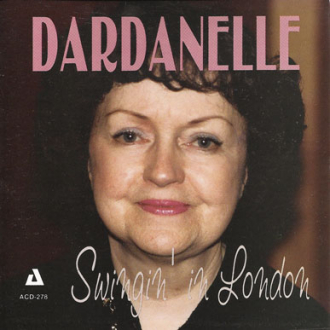
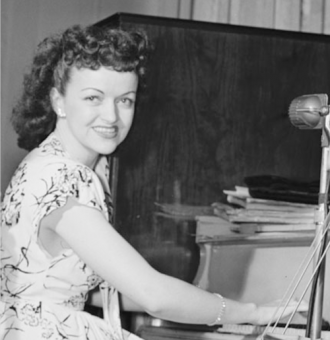
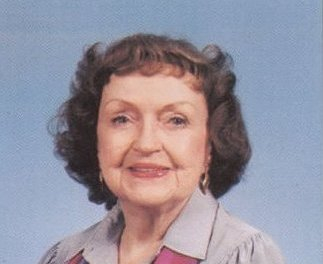
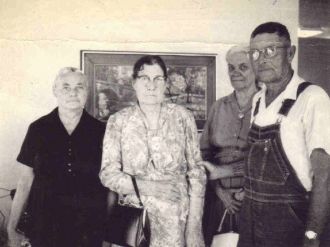


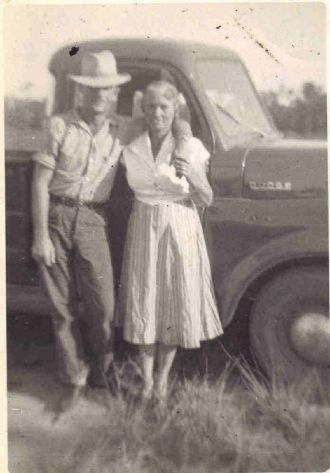
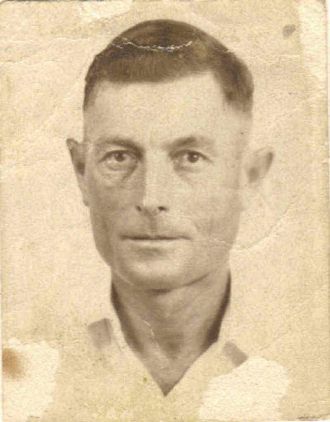
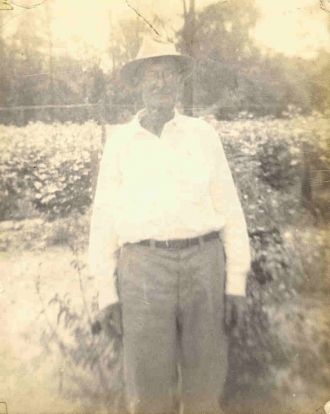

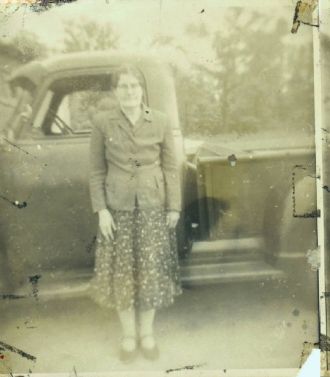
Alice Jennette Shirley was born 15 March, 1908, in Sugar City, Idaho. She was “strong and healthy” at birth. Yet amazingly, after having eight children and living a physically challenging life until her late 70’s, it was found she was born with a hole in her heart.
The hole was finally discovered by doctors puzzled by a large growth on one side of her heart when she was 78. Fearing it was cancer, they scanned her heart. The growth was a mass of muscle built up to help pump her blood in spite of the hole. Usually, children born with holes in their hearts need immediate heart repair in order to live. The doctors were amazed that she had lived with that hole throughout her life and had born eight children, which would ordinarily mean death to someone with a heart like hers.
But more than one doctor, for more than one reason, spoke of Mother as a “wonder woman” or as “a walking miracle.” And she was in more ways than they knew!
Her name: Mother did not like how her name was spelled. She felt it was too long. So, she told people to spell it “J a n e t,” though still calling it Jennette. When she was in college she tried to spell her name that way. But a professor told her that “J a n e t” does not spell Jennette. Some of her sisters still spell her name as “J a n e t.”
Early Childhood: When little, Mother was quick and often slipped away from her mother to explore. They always had to keep an eye on her. One day, when Jennette was two or three, she slipped away and couldn’t be found. Her mother went up the ladder and peeked over the edge of the roof. There she was, eating apples that were spread out on sheets to dry in the sun.” Her mother had to coax her down with a bribe.
Grandmother Shirley was proud of Jennette’s voice. Jennette loved to hear her own mother sing, especially “… do your duty with a heart full of song…” which had lasting impact on her.
Later Childhood: Jennette’s family consisted of eleven children. They lived on a farm and had to work hard. Mother wasn’t always the most willing worker at first, though she later became a very tireless worker. She says as a child she remembers her father had to teach her to bring him a drink of water out to the fields without scowling and pouting. They raised hay, sugar beets, peas, potatoes, and had milking cows. She helped in the hay and beets, etc., and remembered later how they squished mud through their toes and threw clods at each other to break the monotony of hot, hard, work.
There were children born after her, and she helped care for them. She was proud that her father sometimes called her, “Little Mother.”
The family had a lot of fun together too. She loved playing Kick the Can. She also loved playing baseball and basketball. She and other family members loved acting in plays and family members helped with musicals in the area, even in forms of the opera.
1918 Flu: Jennette’s family caught the 1918 flu. This Flu killed a lot of people in the world. Relatives and neighbors helped them with nourishment. Priesthood blessings and this help from others kept them alive.
The Terrible Crisis: While the family had escaped death during the flu, it came in other forms. Jennette’s father was in Utah when he was stricken with appendicitis, and died. The death was shocking. Jennette wrote how hard it was to accept that death.
“I knew Father was in Heaven and that I’d never see him again. So I was completely unprepared when the casket arrived. I didn’t want to see him, or it. Aunt Gertha tried to drag me. I hung onto the bedroom doorknob until Mother said, ‘Leave her alone. She needs some time.’” When everyone was gone, I crept into the room. It was Father all right… It was the 24th of July and a fly was buzzing in the window. I went to dispose of it. Reality had finally come to me. Life had to go on.”
But life did become much harder for them. Grandfather Shirley had left behind him a large family of eleven. Grandmother Shirley had to leave the home and go to work sorting seed peas at the local seed house to provide a living for the family. All the children had to work to keep things going at home.
Jennette mixed bread at night, then left it in pans overnight; her brother Leo baked it in the morning before school. They had to put seven lunches together, which they put into empty lard (beef fat) pails. They fixed mostly egg sandwiches, or jam or honey sandwiches. (They did not have peanut butter.) Leslie, a brother, made the fire and put on a pot of cereal for their breakfasts. They had their own cows, chickens, and a garden.
Mother writes, “Coming home from school I would run across the lawn, toss my books in the front door, run to the wood pile for wood or chips, go in the back door, start the fire and go into the bedroom to change clothes.” Jennette also helped get dinner by peeling potatoes or washing dishes.” One day she had to undertake the disgusting and challenging job of cleaning, degutting, and cutting up several chickens. While the death of their father was a great tragedy, it helped them learn to work hard, and together.
Jennette wrote, “I think of our Mother, after Father died and think, ‘How in the world could she do it?’ She had to depend upon the Lord and her fine family; they had to stick together and take care of themselves. I do hope the Lord is as pleased with that as I am.”
They had little money, so Jennette made her prom and graduation dresses. Her brother told her that she was a good dancer.
Jennette served as the Senior Editor for her high school yearbook. She remembers after writing her report on the Senior Class, she could not find it. She knew she had put it in a
safe place, but could not remember where. Finally, after crying and prayer, she found it in the sewing machine drawer.
After graduation, she worked at a hot springs north of Sugar City. She earned a dollar a day and board. She became a very good swimmer, dived like a “professional,” and could “swing across the rings as easy as pie.” She felt her work was one great big holiday.
By working at the Hot Springs in the summers, she earned enough money to pay for two years of college at Ricks. She even earned enough money to buy some clothes. She said, “One special date I borrowed Sarah’s beautiful red silk polka dot dress. I was the belle of the ball. Life does have its moments.”
After two years of college, Mother and her sister Sarah were able to get jobs teaching --- in Landing, Idaho, above Rockland.
Romance: While teaching, Mother met John and Amy Hadley, who were serving as Trustees of the school and helped the teachers a lot. After Christmas, she met their son, Leroy, who had just returned from a mission to Canada and northern parts of the U.S.
They had a lot of fun that winter. Mother said she could write a book about it. Unfortunately, she didn’t. But she said, among other things, she and Sarah tried to ride skis behind Leroy’s horse. It took them two hours to go a mile. But they finally reached their destination --- his married sister’s place for popcorn.
Of her engagement she writes, “Leroy and I were engaged on my birthday. We needed an extra chair from the school house. Leroy and I went over to get it. We paused for a moment and he gave me a nice long tender kiss, then he held me in his arms and said, “Will you be my wife?” I was surprised, but was ready with my answer. How could I be so sure? He liked Sarah too. But I had made up my mind I would say yes. So I simply said, “Yes.” Everyone was surprised but happy.
They were married in the Salt Lake City Temple. All the family went out to Fred’s and Clara’s (Jennette’s married brother and his wife) to stay for the night --- including the newlyweds. While Leroy and Jennette were out walking in the yard, some of the others sewed up the sheets on their bed.
Early Married Life: Jennette and Leroy married during the time of the Depression. And it was a very hard time financially. Mother writes, “We lived with the folks part of the time and at the dry farm part of the time. The dry farm (no irrigation available) was about six miles west of Leroy’s folks home. That house! That year! Leroy was going to fix it up for me. All they managed to do was tear the partition out and move it around so the wind wouldn’t blow through it. So we lived with a stove in the middle of the floor and no partition behind it.” In the summer sometimes a harmless snake would slither inside.
Times really were hard. Leroy worked for his father for their food and clothes. They had little else. Eventually they rented a farm nearby and fixed up an old house that was on it.
They had two sons by then; Mother took great precautions in the winters to keep them off the cold floors. But, Mother said, in spite of their poverty, “That winter was one of the most enjoyable winters we ever spent. Our enjoyment came from reading aloud good books together. We read the Church History through, the life of Heber C. Kimball, the life of Parley P. Pratt, and the book, Added Upon.” One night they got so involved in reading, Father forgot to go milk the cows. When he had to do so, he put his light in a milk pail, to make sure his father did not see him milking so late.
Eventually they moved near Blackfoot, Idaho, where Leroy bought a farm. They had four children by then. “Leroy worked at everything he could find to do. He rented land beside the forty-acre farm. We thinned beets and in the winter he used to work at the Sugar Factory. Sometimes he’d haul beets until night, then work all night at the Sugar Factory.
They bought a bigger farm. There was only a two-room house on it. There was no electricity, no trees. “It looked horrible,” Jennette says. But they felt it had prospects.
They had six children by now, the older boys had to sleep in an old boxcar that was outside the yard. It had no heat, and was very cold. The folks attached a rope to a bell, and pulled the rope to ring the bell when it was time for the boys to get up for chores.
They planted a lot of beets and began milking a good herd of cows too. Everyone who was old enough worked and worked hard.
But everyone had a lot of fun too. Jennette writes, “After working in the beets all day we would take our food down to the Blackfoot River. We would build a bonfire and cook wieners and eat together.” They made good strong friends in the community, and they would get together with them for feasts and picnics too. A favorite outing for the family was to the mountains nearby for picnics of fried chicken, potato salad, fresh sliced tomatoes, corn on the cob, lemonade, homemade bread, and cake and/or cold watermelon.
The family undertook building a better home. Leroy bought another small house, tore it down and moved the lumber over. In 1944, many great friends came to help them build onto the house. “We built two rooms and a bath on the east side of the house and extended the roof so it made a nice, big upstairs room. We did all the work ourselves with the aid of the community. Along in January it was time to move the roof over. A group of men came and they disjointed one half of the old roof at the top and sides and bottom. They slid it onto the new [portion[ we had built, secured it into place. [Then they built a center for the roof between the two older portions.] A day or two after we finished, it snowed. We were surely grateful [we had] a roof over us before winter fully set in.”
There were other blessings of help from neighbors. Jennette tells, “On the 15th of March, on my birthday, a group of ladies surprised me by bringing in their dinner and coming ready to paper the inside of the house. We papered all three rooms. We really did work to get that house papered that day.”
A Second Crisis: The winter of 1947 was filled with sickness: Arlin had rheumatic fever. Shirley, Lenet and Johnnie had mumps. Jennette took food into the bedroom for three months to some sick child.
Unfortunately, Johnnie’s mumps masked a case of appendicitis. Before the more serious illness was discovered, it was too late, and Johnnie died of a ruptured appendix at the age of five. His death was a great shock and sorrow to his parents and family.
To salve their sorrow, eventually Jennette and Leroy had two additional children, though Jennette was in her forties, making the total number of children eight.
Every summer the family had big hay crews come. Jennette had to cook for a lot of men, and she had to do everything from scratch: chickens had to be killed, defeathered, disemboweled, cut up, then fried. New potatoes had to be dug out of the ground, then cooked. [They were often cooked with fresh peas, which had to be picked and shelled, then creamed. All cooking was done for years on a wood fire.] Lettuce, radishes, carrots were picked, washed and cut up for cooking and salads. Some kind of fresh bread was often baked. Cakes were made, and Jennette often made homemade ice cream. It was a tremendous amount of work. But it was all so fresh and delicious!
One year, Leroy came in with his haying crew, and Jennette was not there. There was no food prepared. He was very upset, and tried to make some kind of meal, but obviously could provide little for very hungry and greatly disappointed men. They went back to work. A long time later, Jennette came. She too was very upset. She had gone early in the morning to pick some currants in the field with a neighbor. An old mean bull, on whom Father had put blinders to make him less dangerous, had rubbed them to the side so he could see, after all. The angry bull had kept Mother and her friend up in a tree for hours!
The Children Grow Up: Around the time Lee and Susan were born, some of the older children were leaving home. Darrell went first to BYU, then on a mission, then into the Army. Arlin stayed and helped Leroy on the farm, and learned to fly. But then he too went on a mission. Shirley went to BYU.
Another Move: The long, wind and snow-blowing winters wore greatly on Leroy. The year of 1956, just before Darrell came home from the Army and Arlin came off his mission, Father bought another farm in Emmett, Idaho, a milder climate. Leroy, Jennette, and Grandfather John E. Hadley went back to pick the boys up from the East Coast, and saw many special sites going and coming. Then the family moved to Emmett. By this time, Shirley had graduated from BYU and was teaching school in California. After they moved to Emmett, Douglas joined the Marines for a while, then went on a mission.
5 Children’s Marriages: The move to Emmett had significant influence. Both Darrell and Arlin found their wives from that area. Once the children started marrying, there was a steady stream of marriages. Shirley married first in 1956. Then Arlin married the next summer, 1957. Darrell married that same fall, 1957, and Lenet married the following winter, 1958.
The Third Crisis: The winter of 1960 was a very difficult one for Jennette and Leroy. Jennette developed Hodgkins Disease. The x-rays showed one lung almost filled with fluid. Through radiation treatments they were able to handle the problems, for a time, but were told that she would only live for a few years. In addition, by that time, many family farms were in deep financial problems, and Dad’s was among them. They struggled both with the physical distress of her illness and the never ending worries of heavy farm debt.
Douglas finished his mission, married, and they lived on the farm with Jennette and Leroy. This brought help and comfort to them. There was also Lee and Susan, who still lived at home, bringing them joy as well as continued family responsibility.
The crisis worsened in 1964. While the disease had been put at bay for a time, it returned, and the family were told that Jennette had only a few months to live.
The cancerous growth greatly enlarged her stomach; her arms and legs were starved and wasted. I visited my parents for a month, but then had to leave, as I had my own responsibilities at home. I grieved that my efforts to help had seemed so pitiful.
I will never forget the moment at the airport when Mother turned away from me in grief and loneliness. She could not bear to say goodbye, for we were under the belief this “goodbye” would be until the Eternities.
The Sunday after my return, our whole family fasted and knelt in prayer, that the doctor’s word, that she had only two more months to live, might not be realized. As we knelt, I felt a strong comfort in knowing that my brothers and sisters similarly knelt in their family groups, also fasting and praying for Mother’s life. Knowledge of the goodness of these family members and the strength of their faith in God, added to the desperate hope that we might be favorably heard.
After our united petitions, Spencer Palmer, [for he and Shirley were present with Mother then,] laid his hands upon her head to give her a blessing. In spite of all the physical evidence, in spite of the professional pronouncements, he was prompted by the spirit to promise Mother that she would live to an old age!
Mother’s acceptance of this blessing --- with faith, greatly impressed me. And the spirit which whispered promise through that blessing spoke truly. In spite of the fact that Hodgkins Disease was considered incurable, through a combination of difficult medical treatments and miracle, the tumor within her stomach was destroyed and health and vigor returned to her body.
The medical treatments consisted of cobalt treatments to shrink the tumor in her stomach. After that they gave her hydrogen mustard gas in her veins. The doctors would come in their leather aprons, gloves and boots, because if they got some of that on them, it would kill them. These treatments were terribly, terribly hard on Mother. But through some miracle, they worked
Mother’s health was restored, and she lived to enjoy the growth of all her many wonderful grandchildren. She saw many who were not even born yet, married. And she lived to see, experience, and enjoy many other wonderful things in her life. She did indeed live to an old age --- not passing away until 1987. Her life had been extended for twenty-three years. Even then, her death did not come from Hodgkins Disease, but from that hole in her heart with which she had been born, though a lymphoma for which she took chemotherapy for several years was a contributing factor.
Once while visiting the doctor who treated her for Hodgkins, not LDS, she overheard him tell a nurse, “Here comes a walking miracle.” He knew it was not the medical technology alone which had saved her life from Hodgkins.
However, there was still the other part of the crisis in their life that had to be overcome. They still struggled with overwhelming farm debt. Eventually, Leroy traded the farm for an apartment house in Boise, and he found a job. Jennette enjoyed the apartment house. She and Mary Lou went downtown often. They did not have any money to shop, but they went down to look. But Leroy was miserable in his job, and eventually bought a butcher shop in a place called Grandview. They and Lee and Susan moved out to Grandview to live, leaving Douglas and Mary Lou to run the apartment house.
While the butcher shop too proved to be financially unsuccessful, it led them to a position which was perfect for them. Leroy eventually became Water Master for the farmers in Grandview. This allowed him work in the summer with enough income to support themselves, [Dad raised some calves on the side], and it gave them winters off where they could travel to visit their children and grandchildren. [I, Lenet, had reason to feel this several step set of circumstances was also a miracle, as I record in my Father‘s history.]
The Fruitful Rewards: Jennette and Leroy had wonderful experiences in the latter part of their lives as they were blessed to visit and be visited by their families. These experiences are far too many to recount. I can only share some highlights, and will generally share more of those which relate to my own family.
Their 50th Wedding Anniversary: Dad and Mother were rightfully honored for reaching their 50th anniversary as loving husband and wife. First there was a surprise party for them in Grandview. Then a big celebration in Provo. Not only the children, but many other members of their extended family came to honor them. There was a dinner at a special restaurant for them and their children and spouses. A special quilt was presented to them, under Shirley’s work and direction. We held a program, featuring slides of their lives. We had a picnic in the park, and later, many pictures taken at Darrell’s church, where he was bishop. Then there was an evening program in the church where the members of each family presented talents. I wrote and read a special tribute to them.
The highlight, however, was the special sacrament and testimony meeting we held in Darrell’s house where all their children, spouses, and grandchildren [except three who were serving missions] gathered. Mother’s own account of the meeting follows:
“Bishop Arlin Hadley took charge. Jim Peterson gave the opening prayer. Songs were sung (our family all have beautiful voices). It was such a thrill to me. Father and I sat where we could see everyone.
The priests and deacons [all grandsons] prepared and passed the sacrament and the time was spent giving our testimonies. I can say this ‘It was a bit of Heaven here on earth.’ I cry with joy to think of it now. To hear each one of our families bear their testimonies in their own way, it was a most spiritual experience. I’m sure we felt the blessings of our heavenly Father there that day --- a part of His family. I hope He was pleased with us.”
Mother was honored several times by groups in her wards. She wrote, “The Mutual girls voted for me to be their special guest on Wed., their mutual night. It was truly an honor for me. I wore my special white dress. And Wendy introduced me and gave a short story of my life. They pinned a corsage on me and gave me a big spontaneous hug.” Another time the Relief Society sisters honored her as “Queen for a Day” at a homemaking luncheon. On another occasion, she was honored for her art work, and especially for getting a lot of the sisters in Grandview interested in painting; she had taught them how.
Jennette and Leroy loved visiting their family. Because we lived in many different areas, they came to visit us in North Carolina; Tulsa, Oklahoma; Indianapolis; and Florida.
They made two trips to Indiana, enjoying the children, seeing the city, going shopping, having lunch out. They also enjoyed Family Home Evening where they told of their family lives in the early days. The children enjoyed hearing it. They came to the mutual talent show. Jennette wrote, “Tomi was a character from funny paper fame. She and her funny paper friend flashed on and off the stage for funny quips and predicaments. She was well heard and distinct. Jeff sang ‘MacNamaras Band.’ He sang with quickness and gusto. He even did a jig after. The audience really liked it.”
A highlight was a trip to Brown County, which is famous for its colorful fall foliage. She wrote, “We stopped at a very colorful shop [brimming with colorful gourds and
pumpkins, and other fall goodies] and bought some pumpkins for Thanksgiving, apples, etc. The autumn leaves were unbelievably pretty…We stopped and viewed beautiful sights and took some pictures that could never do justice to the coloring in the trees.”
We also went to Washington D.C. They were going to meet Susan, flying down from New York with her boys, to go back with them to Utah. And they really wanted to see the Washington D.C temple. They had heard so much about it. We even did a couple of sessions. Mother found the grounds especially beautiful, and everything so peaceful.
After we moved to Gainesville, Florida, they came to visit us there too. They really enjoyed their flight out. Mother wrote, “Again we felt loved and were escorted home. The weather is pleasant and lovely, and the country is beautiful. The children greeted us at home. Brave Tomi and laughing Jeff and David with knowing brown eyes.” [John and Richard were both on their missions then.]
Dad went to a Florida football. Mother stayed home, relaxed and “enjoyed the lovely home and pleasant surroundings.”
They enjoyed their visit to the Millhopper, an interesting old sinkhole, with stairs going down deep into it, where there is wonderful tropical foliage.
Jennette particularly enjoyed a day visiting Silver Springs: a ride in a glass bottom boat over a natural springs full of fish, with birds in the trees alongside. Took another ride where we saw jungle animals and monkeys. “We walked down to the Deer Park and saw deer, cute and fat goats and llamas.”
Mostly they enjoyed being with the family and doing things with them -- She commented how special it was, reading the Book of Mormon and prayer. They had Thanksgiving with us. The day after we all went to Disney World. I stayed with mother and we did slower, quieter things, letting the others go for more thrilling experiences. Mother said, “We went home weary but well fed on fun and extravagant things to do and see.”
From Florida Mother and Dad went on to New York to help Susan with the birth of their third child.
One Christmas, when John, Richard and Tomi were all at BYU, we flew to Provo for Christmas. Shirley and Spencer went to California for the Holiday Bowl, so they let us stay in their house. Mother and Father drove up and joined us there. Mother wrote, “We took over at the house. The boys and Tomi moved in too. And they were so happy to be together. They were just fun to be around. They went skiing three days. [We had a great time laughing at the funny things that happened as all these first time skiers, with inadequate ski clothes, had hilarious experiences.] The holidays were a huge success.”
Mother’s Final Years: Jennette developed lymphoma. It had grown into her spleen and liver before discovered. Mother took intermittent chemotherapy for several years. The medicines she took always caused her heart to give her a lot of trouble. She grew increasingly tired and sometimes discouraged.
Father retired from being Water Master. Some in the family tried to talk them into moving to Utah, but they liked the weather and the less traffic in Idaho. They bought a very nice lot in Boise for their mobile home where they could fully retire and spend their final years working in the temple. The lot was very nice with lots of grass; Mother planted a lot of flowers; roses surrounded the lot. They planted some of the pine trees. She liked being closer to town. The long drive to Grandview had grown hard on her.
The time came for grandchildren to begin marrying. We went to Provo one spring to meet John’s and Richard’s fiances. Father and Mother came to Provo and met them too. Mother wrote, “We had so much fun sitting on blankets and wrapped up all in a big bunch. [At a BYU Baseball game]. It was a delightful time to all be together.” We went to Shirley’s for potluck dinner Sunday, watched a choir with Richard in it on T.V.
Mother continued to have problems with her heart. One day she wrote, “My heart went crazy this morning but I lived through it. Its perfectly normal since then.” It worried her.
The Dr. told Dad, “I would like to x-ray her heart. There is something wrong. But I don’t know what it is.” The e-rays showed the mass of muscle, and eventually the hole there. She had been born with it. Father heard the machine she was on. Instead of a “beat, beat”, there was a “swussh, swussh,’ because of the hole.
Father said of her, “Jennette didn’t complain. One thing about her, she was very patient.”
Her health continued to deteriorate. She was taken to the hospital for blood transfusions. She felt it was useless to continue to go, but Father could not keep from taking her.
Mother also suffered from declining eyesight. For a long time, she could only see shapes around a black hole, which kept her from doing her beloved oil painting. One of the last entries in her journal, was that she suffered from “Eye ache!!! I can only see for awhile.”
I went to visit her just before her death, and stayed with her. She told me that she was ready to pass beyond the veil. She was not afraid to do so, because she had not done anything she was ashamed of in her life. I felt it an honor to be with her and to help her make it through “The Second Passage” --- from this life into the next, just as she had brought all of her children through the veil from the pre-mortal existence into this life.
It was actually a miracle I was able to go to be with her, because I was in school at the University of Florida then, taking classes. But there was just a long enough break at the right time, and an understanding professor, to be with her and to stay for the funeral.
Mother was very concerned about her family and their spiritual welfare. She prepared her own “Last Testimony” which she recorded just before her death. She had it read at her funeral, urging all of her family to hearken to the commandments and to live good lives. She died in her sleep, peacefully on March, 6, 1987.
At the viewing and funeral, there were many people who came who had not seen each other for a long time, so there was much greeting of loved ones. At first I was a little concerned whether these happy greetings took away from respect for Mother. But as I thought about her, I felt strongly she was doing the very same thing on the other side of the veil. I knew she was being greeted by her beloved Johnnie, and by her own dear loved Mother and Father, and sisters and brothers, and friends, and prophets, and the Christ!